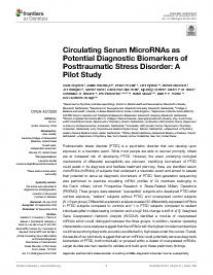Circulating Serum MicroRNAs as Potential Diagnostic Biomarkers of Posttraumatic Stress Disorder : A Pilot Study
Posttraumatic stress disorder (PTSD) is a psychiatric disorder that can develop upon exposure to a traumatic event. While most people are able to recover promptly, others are at increased risk of developing PTSD. However, the exact underlying biological mechanisms of differential susceptibility are unknown. Identifying biomarkers of PTSD could assist in its diagnosis and facilitate treatment planning. Here, we identified serum microRNAs (miRNAs) of subjects that underwent a traumatic event and aimed to assess their potential to serve as diagnostic biomarkers of PTSD. Next-generation sequencing was performed to examine circulating miRNA profiles of 24 members belonging to the Dutch military cohort Prospective Research in Stress-Related Military Operations (PRISMO). Three groups were selected: “susceptible” subjects who developed PTSD after combat exposure, “resilient” subjects without PTSD, and nonexposed control subjects (N = 8 per group). Differential expression analysis revealed 22 differentially expressed miRNAs in PTSD subjects compared to controls and 1 in PTSD subjects compared to resilient individuals (after multiple testing correction and a log2 fold-change cutoff of ≥|1|). Weighted Gene Coexpression Network Analysis (WGCNA) identified a module of coexpressed miRNAs which could distinguish between the three groups. In addition, receiver operating characteristic curve analyses suggest that the miRNAs with the highest module memberships could have a strong diagnostic accuracy as reflected by high areas under the curves. Overall, the results of our pilot study suggest that serum miRNAs could potentially serve as diagnostic biomarkers of PTSD, both individually or grouped within a cluster of coexpressed miRNAs. Larger studies are now needed to validate and build upon these preliminary findings.
Geachte bezoeker,
De informatie die u nu opvraagt, kan door psychotraumanet niet aan u worden getoond. Dit kan verschillende redenen hebben,
waarvan (bescherming van het) auteursrecht de meeste voorkomende is. Wanneer het mogelijk is om u door te verwijzen naar de bron
van deze informatie, dan ziet u hier onder een link naar die plek.
Als er geen link staat, kunt u contact opnemen met de bibliotheek,
die u verder op weg kan helpen.
Met vriendelijke groet,
Het psychotraumanet-team.
In: Frontiers in Genetics ISSN: 1664-8021 | 10 | november | 1042
https://www.frontiersin.org/articles/10.3389/fgene.2019.01042/full


